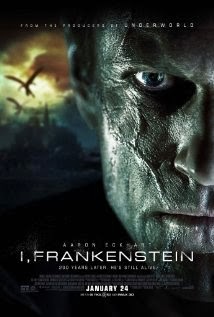Today we have the new supernatural action movie I, Frankenstein starring Aaron Eckhart. Based on the graphic novel, it has now hit the big screen. It is also from the people who brought us the Underworld movies which I was a huge fan of back in the day.
The story stays surprisingly faithful to Mary Shelley's original novel, up to a certain point. Dr. Frankenstein creates his monster (Eckhart), then abandons it, and the monster gets revenge by killing Frankenstein's wife. The doctor chases him through the arctic but dies from exposure to the elements.
The plot of the movie picks up right after these events. The monster decides to give his creator a proper burial, but as he is doing so he is attacked by a mysterious group of malevolent beings. Nearby gargoyles come to life and save him. They take him to their base at the Notre-Dame Cathedral, and explain that he has just been dragged into a war between demons and the Gargoyle Order which is made up of angels who take the form of gargoyles (naturally). Their queen, Leonore (Miranda Otto), takes pity on him and asks for his help in protecting mankind from the bad guys. She also gives him the name Adam. Adam, however, wants nothing to do with their struggle and heads off to the most remote corners of the earth in the hopes that the demons won't bother him there.
Centuries later, the demons finally catch up with him. Realizing there is no refuge from them, he decides to take the fight to them. He heads back to Paris and proceeds to "ascend" them, sending them down to Hell. The gargoyles notice this and are angry that he is recklessly engaging the demons out in public and endangering humans lives. They bring him to the cathedral to confront him on this. Soon the demon prince Naberius (the ever sinister Bill Nighy) gets wind of this and sends his minions to attack the cathedral in order to capture Adam. Naberius wants to use Adam to bolster his forces and make them unbeatable. Will the good guys triumph over evil, or will it be hell on earth? For that matter, just who are the good guys?
I like this movie to a certain extent. It has stylish visuals and plenty of cool moments. On the other hand, the demons are pretty generic. I could swear I've seen them in countless other movies. The gargoyles are more creative, but still nothing to write home about. And Eckhart's performance, while not bad, is nowhere near as good as it was in The Dark Knight. Then again, that's a pretty high standard to maintain.
The music is another high point of this film. It features a gothic orchestral score and hard rock songs. It's a step above what I usually hear in movies. I actually downloaded the ending theme on iTunes just now while writing this review.
Bottom line: If you go to see this movie, you'll be entertained. Just don't expect anything groundbreaking.








